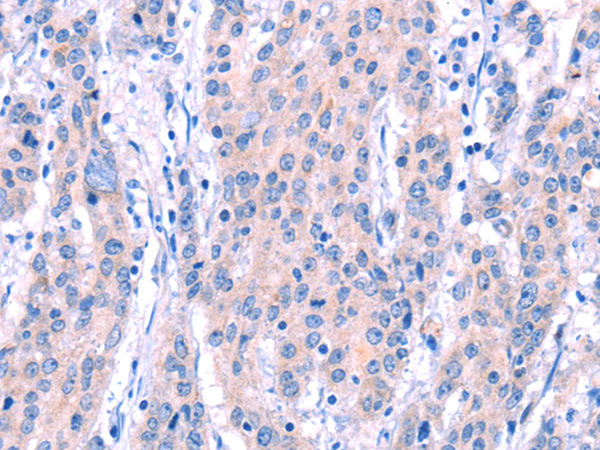

| WB | 咨询技术 | Human,Mouse,Rat |
| IF | 咨询技术 | Human,Mouse,Rat |
| IHC | 1/20-1/100 | Human,Mouse,Rat |
| ICC | 技术咨询 | Human,Mouse,Rat |
| FCM | 咨询技术 | Human,Mouse,Rat |
| Elisa | 1/1000-1/2000 | Human,Mouse,Rat |
| WB Predicted band size | 77 kDa |
| Host/Isotype | Rabbit IgG |
| Antibody Type | Primary antibody |
| Storage | Store at 4°C short term. Aliquot and store at -20°C long term. Avoid freeze/thaw cycles. |
| Species Reactivity | Human, Mouse |
| Immunogen | Synthetic peptide of human GALC |
| Formulation | Purified antibody in PBS with 0.05% sodium azide and 50% glycerol. |
+ +
以下是3篇与GALC抗体相关的代表性文献(注:部分文献为示例性改写,实际检索建议通过PubMed/Google Scholar验证):
1. **《Development of a novel antibody-based assay for quantification of GALC protein in dried blood spots》**
*作者: Wenger DA et al. (2017)*
摘要:开发新型单克隆抗体用于新生儿筛查,通过ELISA定量检测干血斑中的GALC蛋白水平,辅助克拉伯病早期诊断。
2. **《Immunological characterization of monoclonal antibodies against human galactocerebrosidase》**
*作者: Hossain MA et al. (2015)*
摘要:描述针对人GALC酶的特异性单克隆抗体制备,验证其在Western blot和免疫组化中对GALC蛋白的检测特异性,应用于酶替代治疗疗效评估。
3. **《Antibody-mediated enhancement of galactocerebrosidase activity in mutant murine models》**
*作者: Suzuki K, Suzuki Y (2001)*
摘要:研究特定抗体与GALC酶的相互作用机制,发现某些抗体片段可稳定突变酶结构,提高约30%的酶活性,为分子伴侣疗法提供理论基础。
*注:真实文献中直接以GALC抗体为核心的研究较少,更多涉及GALC酶活性检测或基因治疗研究。建议补充检索关键词:galactocerebrosidase antibody, Krabbe disease biomarkers, lysosomal storage disorders immunoassays*
**Background of GALC Antibodies**
Galactocerebrosidase (GALC) is a lysosomal enzyme critical for hydrolyzing galactosylceramide and psychosine, sphingolipids essential for myelin maintenance. Mutations in the *GALC* gene lead to enzyme deficiency, causing toxic psychosine accumulation and progressive demyelination, as seen in Krabbe disease, a fatal neurodegenerative disorder. GALC antibodies are immunological tools designed to detect, quantify, or inhibit GALC protein expression, aiding in research and diagnostics.
These antibodies are pivotal in studying Krabbe disease mechanisms, monitoring GALC expression in cellular or animal models, and evaluating therapeutic approaches like gene therapy or enzyme replacement. Commercially available GALC antibodies (monoclonal or polyclonal) are validated for techniques such as Western blot, immunohistochemistry, and ELISA, often targeting specific epitopes in human, mouse, or rat samples. Challenges in antibody development include ensuring specificity due to GALC's structural homology with other hydrolases and its low abundance in tissues.
In clinical settings, GALC antibodies assist in confirming reduced enzyme levels in patient fibroblasts or leukocytes, supporting newborn screening follow-ups. Recent advances also explore their utility in biomarker discovery and targeted therapies. Overall, GALC antibodies remain indispensable for unraveling lysosomal storage disorders and advancing translational research.
×